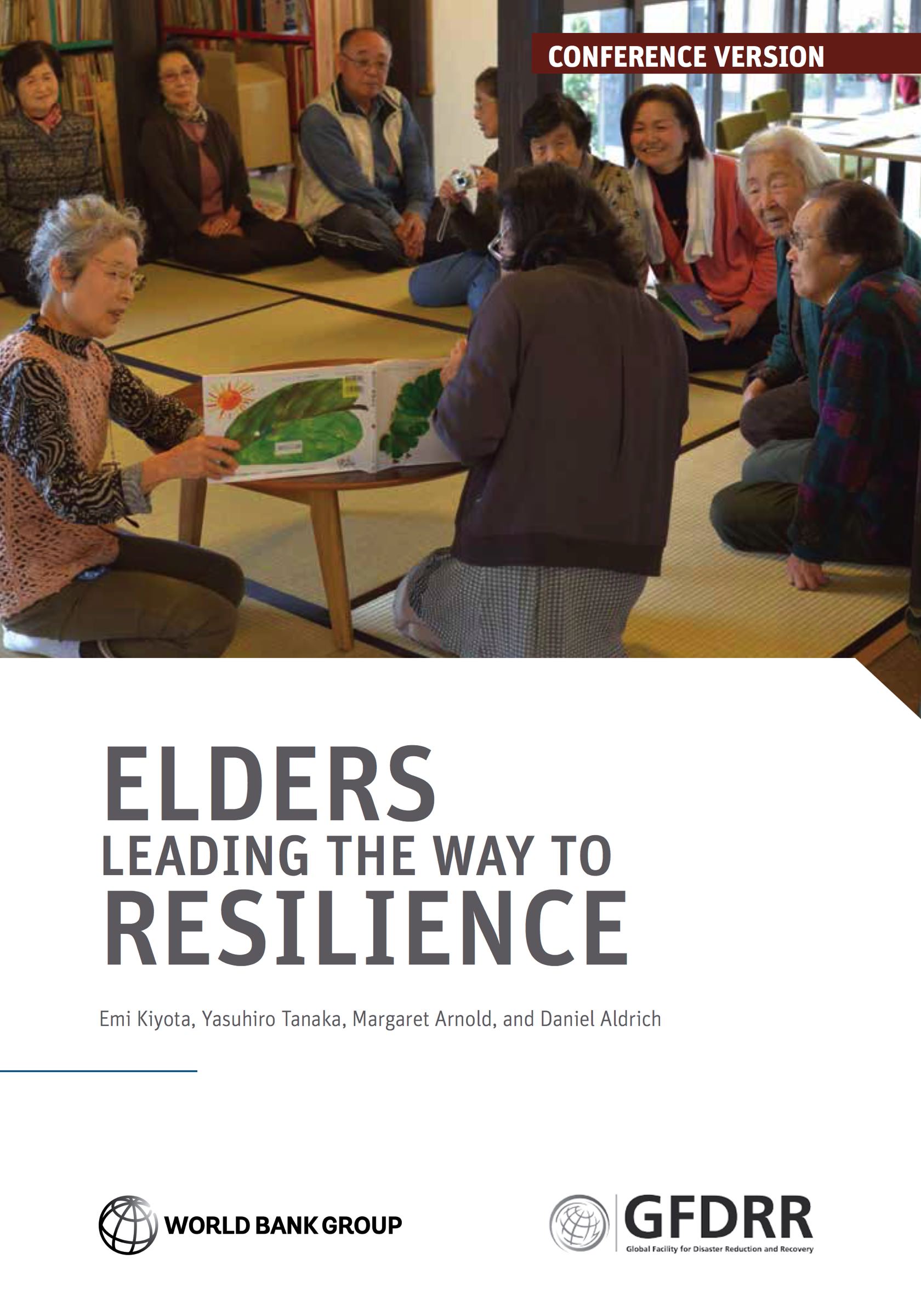Contents
This research analyzed and evaluated the impact of an elder-centric, community-driven project on levels of social capital among the community members of Ofunato, Japan, a disaster-affected city.
We employed a mixed-method research approach with both quantitative and qualitative data to examinel 1) relationships between the Ibasho café and the level of social capital and 2) Ibasho café’s influence on the well-being of community members.
Background:
Elders leading the way to inclusive community resilience
Our approach to disaster risk management emphasizes socially inclusive community resilience. Marginalized groups such as children, disabled people, displaced people, elders, indigenous peoples, migrants, youth, and women suffer disproportionately from disasters and should have equal access to necessary resources and services to manage risk. Moreover, marginalized groups are typically considered vulnerable and in need of protection. Nevertheless, their capacities and skills often go unrecognized and can be overlooked or undermined in disaster response and recovery.
This report focuses on elder issues. With the simultaneous rise in the number of elders and in climate-related natural disasters, societies worldwide are facing two critical challenges: caring for an unprecedented number of elderly population in our society and reducing the vulnerability of elderly populations affected by disasters. Aging is typically viewed as decline with elders often marginalized both socially and physically.
During our time in Japan after the Great Eastern Japan Earthquake (GEJE), the Ibasho team often heard people say how important it was for them to be surrounded by familiar faces after the tsunami. We also heard: “Elders knew how to manage without electricity and water.” These reactions suggest that younger people could benefit from elders’ skills and perspective as much as elders need the support of the younger generation in order to create a resilient community.
What is Ibasho cafe?
The first Ibasho café was developed in Ofunato, a part of Japan that had been devastated by the GEJE and tsunami of 2011. After the GEJE, the leadership of Ibasho, a non-governmental organization, talked to community members and found that older people wanted to do something useful to help the community recover. The Ibasho approach recognizes elders as valuable assets to their community and seeks to empower them to be active participants. Doing so challenge’s society’s negative perceptions and expectations of the elderly, which include social isolation, a loss of dignity and respect, and a sense of uselessness and irrelevance. This approach improves the community’s resilience and its ability to withstand shocks such as disaster and aging by creating a strong informal support system in which elders serve as the catalyst to strengthen bonds among community members of all ages. Since the café was completed in June 2013, all generations have connected in the space, with children coming to read books in the English library, older people teaching young people how to make traditional foods, younger people helping elders navigate computer software, and so on. Elders organized approximately 330 events and welcomed more than 11,000 visitors in the first two years.
Key findings:
1. The frequency of Ibasho café visits has a strong relationship with sense of belonging to their neighborhood, number of friends, and sense of efficacy
Efficacy:
Regular iBasho attendees have a higher level of belief in their ability to control their environment. Also, older individuals, men and wealthier individuals all felt more efficacious. The elders who manage iBasho have organized various events to educate children about local culture, such as cooking, holiday decorations, and traditional festivals. To prepare for future disasters, elders also organize activities where younger generations learn how to live in an environmentally sustainable manner and survive without electricity and water.
Social networks:
More regular attendance at Ibasho made it more likely that people would report having more friends. The Ibasho café facilitated the friendships more than simply the increasing number of people to talk to. This result suggests that iBasho serves as a place where deep relationships are formed Attendees reported, “Now we are friends because we had conversations here.” The iBasho café has provided a comfortable, informal place where outsiders can find and get to know people from the community, and many long-distance friendships were also formed there.
Sense of belonging:
Regular attendance at iBasho was significantly associated with a deeper sense of belonging. There may be two reasons behind this finding. First, most of the Ibasho café users are from Massaki area, where many residents have lived for an extended period. Second, Ibasho café users may already have been inclined to participate in community activities, such as sports events or the local festival, before the GEJE, thus forming stronger relationships with members of their community.
2. Perception of recovery
Comparing 2013 and 2014, the quantitative data suggests that Massaki (Ibasho’s neighborhood) saw a sharp change in the level of perceived neighborhood recovery over time. While we cannot be sure of the cause, two possibilities seem likely. First, the Ibasho café was built in Massaki, giving residents a permanent structure they are proud of and can use in place of temporary structures provided by the city. Second, Massaki was chosen for the Ibasho café because of its leaders’ strong commitment to creating a social space for its residents. That high level of commitment may have resulted in other improvements that also influence local residents’ perceptions regarding the level of neighborhood recovery.
3. Elders have stronger sense of belonging to their community.
The duration of residency had a positive connection to the sense of belonging to their neighborhood. Since elders reside in their community for a long period of time, they have a stronger sense of belonging to their communities than younger generations. Hence, they are more likely to invest their time and effort to improve their community to be more resilient.
4. Walkability is a critical point to determine whether or not users would engage with this type of service—especially older users.
Most of the regular users live within walking distance of the café. This result is especially critical to allow elders to be engaged in the Ibasho program since most of them do not drive. Moreover, the costs incurred for using public transportation may challenge individuals with fixed income, such as pensioners.
Policymakers and NGOs should:
- Include infrastructure development as a part of community development to provide people with a tangible way to measure their progress. It also makes it easier for them to develop a sense of ownership in a project, and to invest the effort needed to ensure long-term sustainability.
- Empower elders to sustain the place and its programs, It is crucial to truly trust elders to run the program while providing the support they need to develop those skills, particularly during the early stages of development and operation. As one elder told us: “Please fully trust us to operate this place, if you would like us (elders) to be in charge..”
- Rethink the role elders in the community and give them opportunities to be useful to others and help realize that they still can be active participants in the social web.
- Encourage a strong solidarity and support system among elders. One individual may not be strong enough to stand up to voice an opinion, but a group of individuals who are the part of the organization can better withstand challenges and pressure from external forces such as regulators and other government officials.
- Involve local government. To achieve stable operation of an Ibasho café or similar project, it is crucial to find ways to involve local government without compromising the initiative’s community-driven nature.
- Make sure donors understand the need for flexibility during the development process. Funders would normally like to see a project completed in a short period of time, but community members may not feel the same sense of urgency
- Be sensitive to cultural differences. While the fundamental needs of human beings don’t change across cultures, lifestyles, community capacities, financial resources, existing knowledge and skills, and social interactions may differ greatly.
- Provide accessible transportation. Since many elders rely on public transportation to move about, it is important to think about how people will get there when planning where to create a place, ideally selecting a site that is convenient to affordable public transportation. Otherwise, many elders and children cannot come unless someone gives them a ride.
- Focus not only on the capacity building within their community, but also bridge and link their efforts to people who are dissimilar and other communities, so that they will gain the higher sense of efficacy and motivation to make their project to be more inclusive and sustain it for a long time.
- This study was funded by the World Bank (GFEDD). Thank you for the support.


